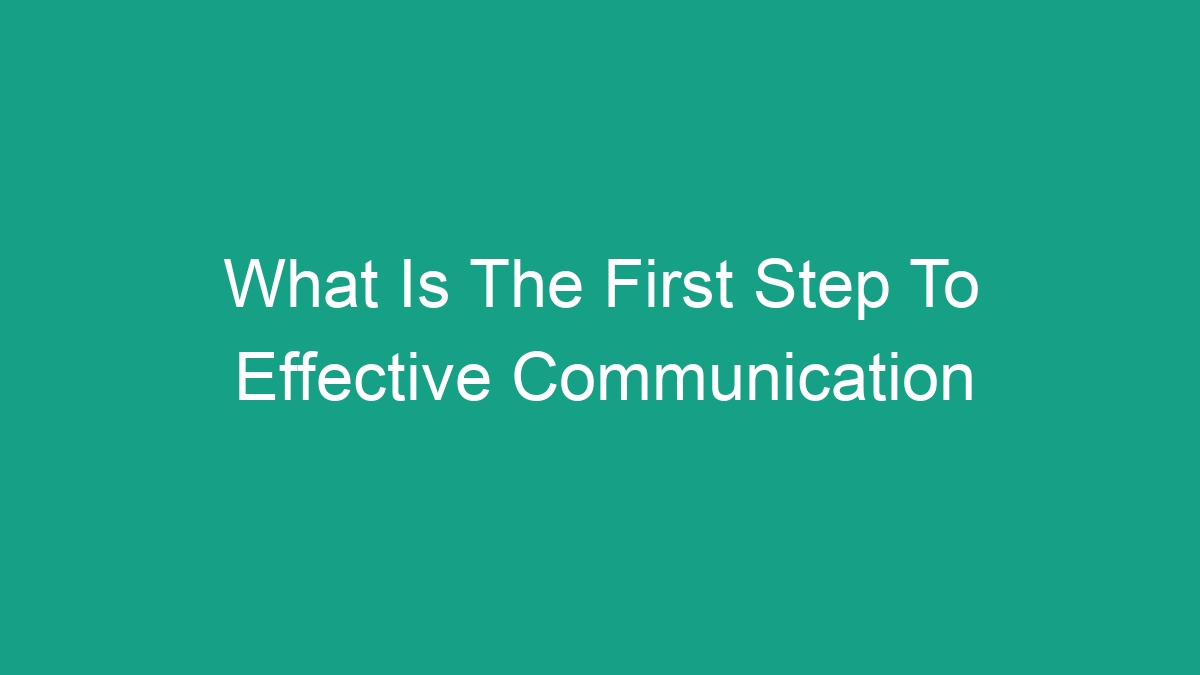
Communication is the cornerstone of every successful relationship, whether personal or professional. Being able to convey messages and understand others is essential for smooth functioning and success in any situation. However, effective communication is not just about speaking or writing; it involves a range of skills and strategies that need to be honed. In this article, we will explore the first step to effective communication and how it can set the foundation for strong and meaningful interactions.
Understanding the Importance of Effective Communication
Effective communication is crucial in all aspects of life. Whether you are dealing with family, friends, colleagues, or clients, the ability to express yourself clearly and understand others is essential for building trust, managing conflicts, and achieving common goals. Here are some key reasons why effective communication is important:
- Building Strong Relationships: Good communication fosters meaningful connections and helps build trust and respect among individuals.
- Conflict Resolution: Clear communication is essential for resolving conflicts and addressing issues in a constructive manner.
- Achieving Common Goals: In professional settings, effective communication is crucial for coordinating efforts and achieving shared objectives.
- Personal Growth: Through effective communication, individuals can express their thoughts, feelings, and aspirations, leading to personal growth and self-awareness.
The First Step to Effective Communication: Active Listening
The first step to effective communication is active listening. This foundational skill lays the groundwork for meaningful and productive conversations. Active listening involves more than just hearing; it encompasses a set of deliberate actions and behaviors that demonstrate your genuine interest in understanding the speaker’s message. Here are the key elements of active listening:
- Give Your Full Attention: When someone is speaking, make a conscious effort to focus entirely on the speaker. Avoid distractions and non-verbal cues that suggest disinterest.
- Show Interest and Empathy: Use verbal and non-verbal cues to demonstrate empathy and understanding. Nodding, maintaining eye contact, and offering encouraging words can convey your engagement in the conversation.
- Avoid Interrupting: Let the speaker express their thoughts without interruption. Interrupting can disrupt the flow of communication and signal impatience or disrespect.
- Ask Clarifying Questions: Seek clarification or additional information to ensure you fully understand the speaker’s message. This shows your commitment to understanding and engaging in the conversation.
- Reflect and Summarize: After the speaker has finished, reflect on their main points and summarize them to confirm your understanding. This also reassures the speaker that their message has been received and acknowledged.
Active listening is a skill that requires practice and intention. By mastering active listening, you set the stage for effective communication and lay a foundation for meaningful interactions.
How Active Listening Enhances Communication
Active listening serves as the cornerstone of effective communication and provides numerous benefits that enhance interactions and relationships. Here are some ways in which active listening enhances communication:
- Building Trust: By showing genuine interest and empathy, active listening helps build trust and rapport with the speaker, fostering a positive and open communication environment.
- Improving Understanding: Active listening ensures that you accurately understand the speaker’s message, reducing miscommunication and misunderstandings.
- Resolving Conflicts: When conflicts arise, active listening can help de-escalate tensions and promote constructive dialogue, leading to effective resolution.
- Enhancing Problem-Solving: By carefully listening to others’ perspectives, you gain valuable insights that can contribute to effective problem-solving and decision-making.
- Strengthening Relationships: Active listening fosters strong connections and promotes a sense of mutual respect and understanding, leading to stronger and more fulfilling relationships.
Through active listening, individuals can create an environment conducive to effective communication, leading to improved interactions and overall success in personal and professional contexts.
Practicing Active Listening in Various Settings
Active listening is a versatile skill that can be practiced in a wide range of settings, including personal conversations, professional meetings, and customer interactions. Here are some tips for practicing active listening in various contexts:
- Personal Conversations: When engaging in personal conversations, focus on giving your full attention, showing empathy, and asking clarifying questions to demonstrate your commitment to understanding and connecting with the speaker.
- Professional Meetings: In professional settings, practice active listening by engaging in attentive and respectful listening, summarizing key points, and seeking clarification to ensure alignment and understanding among team members.
- Customer Interactions: When interacting with customers or clients, active listening can enhance customer satisfaction by demonstrating genuine interest in their needs and concerns, leading to stronger customer relationships.
By consistently practicing active listening in various settings, individuals can develop strong communication skills and establish meaningful connections with others.
Conclusion
Effective communication is a vital skill that underpins success in all aspects of life. The first step to effective communication is active listening, which forms the foundation for meaningful and productive interactions. By mastering active listening, individuals can build trust, understand others, resolve conflicts, and strengthen relationships, leading to overall success in personal and professional endeavors. Through intentional practice and application of active listening, individuals can elevate their communication skills and create positive and impactful interactions.
FAQs
Q: How can active listening improve communication in professional settings?
A: Active listening in professional settings can improve teamwork, problem-solving, and decision-making by fostering a collaborative and cohesive work environment.
Q: What are the benefits of active listening in personal relationships?
A: Active listening in personal relationships can lead to deeper connections, trust, and understanding, strengthening the bond between individuals.
Q: Is active listening a skill that can be learned and developed?
A: Yes, active listening is a skill that can be learned and improved through practice, feedback, and a commitment to genuine engagement in conversations.



